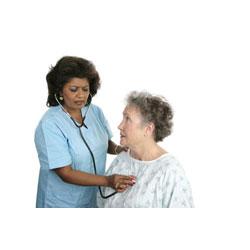
Heart disease is the No. 1 killer of women in the country.
January 27, 2010 — Today, the Society for Cardiovascular Angiography and Interventions (SCAI) launched "WINHeart — Score a WIN for Women," an initiative that raises awareness surrounding gender-based disparities in the diagnosis, treatment and survival of women with cardiovascular disease (CVD).
Simultaneously, Women In Innovations (WIN), a group of interventional cardiologists within SCAI, today released a new report and survey that illustrate why cardiovascular disease is underrecognized and under-treated in women despite the near split in prevalence of heart disease between men and women.
The report, "Gender-based Issues in Interventional Cardiology: A Consensus Statement from the Women in Innovations (WIN) Initiative," highlights significant disparities in women's treatment and outcomes. One suspected reason for the disparity is women account for only 20 to 25 percent of patients enrolled in most CVD clinical trials.
"The majority of data from clinical trials is based on a population of mostly male participants, and as a result, women are being treated according to data based on men," said Roxana Mehran, M.D., FSCAI, director of outcomes research at the Center of Interventional Vascular Therapies at Columbia University, N.Y., and report co-author. "With this information, it is not surprising women's outcomes are significantly worse than men's after treatment. What is surprising is that more is not being done to close this gap, which is what we seek to address through WINHeart."
The WINHeart survey, with more than 300 respondents who are members of WomenHeart: The National Coalition for Women with Heart Disease, found 80 percent of women who had CVD never considered participating in clinical trials because they were not aware clinical trials were recruiting patients (50 percent), they were concerned about effects of treatment or lack of effects if given placebo (31 percent), or there were logistical issues such as transportation issues, geographic barriers, financial barriers or lack of time (20 percent).
In addition, only 10 percent of women said their physician spoke with them about participating in a clinical trial when they were first diagnosed with heart disease or a heart attack. WomenHeart's members include women living with and at risk for heart disease, friends and family members and health care professionals nationwide. SCAI and WomenHeart are partnering on the WINHeart initiative to expand research and raise awareness surrounding the disparity in care for women with heart disease.
In addition to an absence of female participants in clinical trials, the widely published WIN report suggests a lack of recognition of heart problems and subsequent treatment, which results in women not receiving early medical intervention, including percutaneous coronary interventions (PCI) or angiography. The report found that only 33 percent of percutaneous coronary interventions, such as angioplasty, performed annually are done on women. The delayed treatment can ultimately cause more serious CVD.
The WINHeart survey found 30 percent of women waited more than 30 days to seek medical treatment after experiencing symptoms of heart disease or heart attack. Alternatively, 22 percent of women waited one to five days, and nearly 34 percent waited less than one day. In addition, the survey noted women received a delayed diagnosis because 30 percent of respondents said they experienced atypical symptoms or were not in the typical age group to experience a heart attack (35 percent).
"As a physician and a woman, it's alarming so many women are not aware heart disease is their No. 1 killer in America," said report Co-Author Bonnie Weiner, M.D., MSEC, MBA, FSCAI, and director of interventional cardiology research at Saint Vincent Hospital at Worcester Medical Center in Massachusetts. "Women tend to be less aware of symptoms and subsequently see their doctor much later than they should, which unfortunately results in poorer outcomes and fewer treatment options. A key concern for us is to better ensure women know the signs and symptoms of a heart attack, including atypical symptoms specific to women."
In fact, 70 percent of women surveyed in the WINHeart survey said prior to their heart disease or heart attack they were not aware that men and women sometimes experience different heart attack and heart disease symptoms.
While the current evidence-based guidelines for cardiovascular care recommend men and women should receive the same treatment, the WIN report suggests women with unstable angina are less likely to be prescribed aspirin or lipid-lowering therapy (statins) while in the hospital and during hospital discharge. Additionally, the report notes that often times, more than 24 hours after presenting heart attack symptoms, women are less likely than men to have an electrocardiogram done within 10 minutes of presentation, be cared for by a cardiologist during their inpatient admission, and be given heparin or an ACE inhibitor acutely.
"Doctors are eager to see more research that evaluates outcomes based on the differences in biological and genetic markers between men and women," said Steven R. Bailey, M.D., FSCAI, president of SCAI and chief, division of cardiology, Janey Briscoe Distinguished Chair of Cardiovascular Research and professor of medicine and radiology at the University of Texas Health Sciences Center at San Antonio. "We want to provide customized care based on gender, and in turn, save more lives."
WIN plans to address the issues identified in the report and survey by launching and facilitating women's enrollment in clinical trials to further explore the differences in women's outcomes in heart disease. Additionally, the organization plans to enhance resources for health care providers who treat women with heart disease, as well as increase public education on this issue.
For more information: www.scai.org, www.womenheart.org


 November 12, 2025
November 12, 2025 









